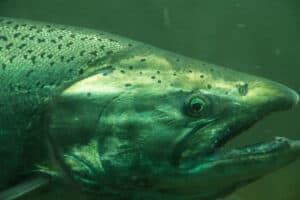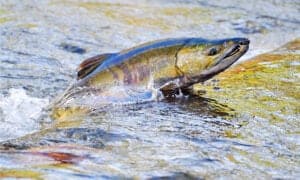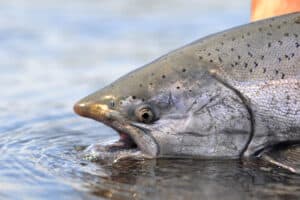The largest king salmon ever caught by an individual was a 97-pound whopper! Les Anderson reeled in the giant in 1985 on Alaska’s Kenai River. It remains the world record for the largest king salmon ever caught. The fish was almost 5 feet long! The largest king salmon ever caught by a commercial fishing company was also in Alaska. This monster was 126 pounds and caught in a fish trap in 1949.
Find out just how big these massive fish were and where they were caught.
How Big Do King Salmon Get?
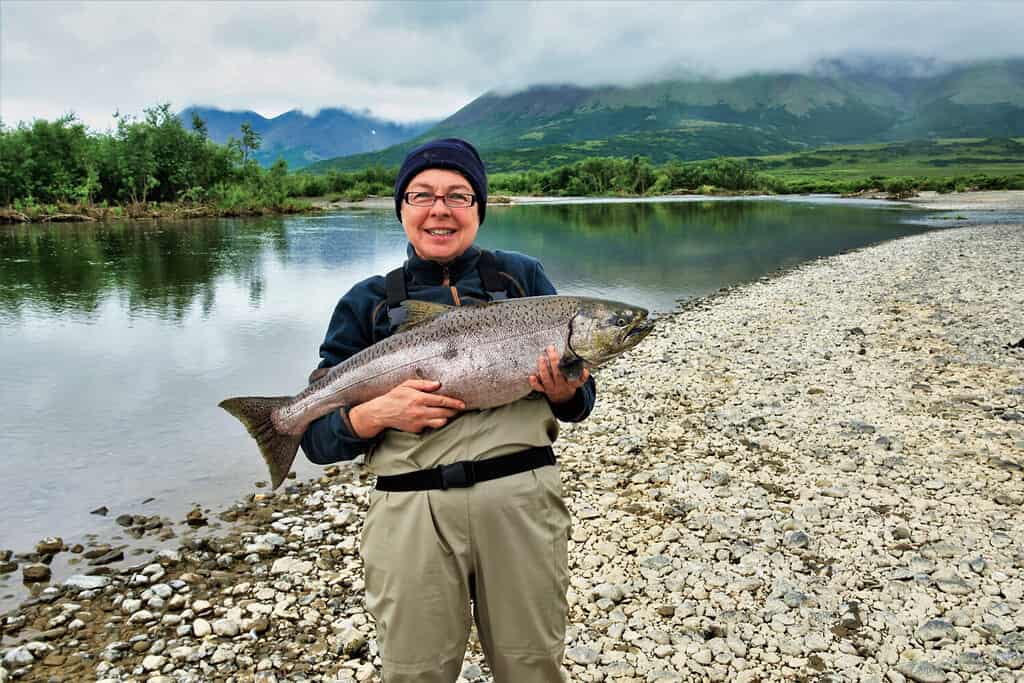
Even “small” king salmon are large and require a lot of effort to reel in.
©FarFlungFotos/Shutterstock.com
The largest king salmon ever caught were 126 pounds, caught in a fish trap, and 97 pounds, caught by an individual angler. When you consider that most king salmon top out around 50 pounds, these behemoths were really something to see. The 97-pound fish put up quite a fight before angler Les Anderson was able to bring it in.
Normally, king salmon are between 10 and 50 pounds. This is the largest of the Pacific salmon and is popular with anglers. It is also called the Chinook or blackmouth salmon. In the Northwest Pacific, they are called Tyee salmon, which means “chief” in the Chinookan language spoken by Indigenous peoples. They can routinely get up to 36 inches long.
They live in both freshwater and saltwater. When king salmon are born, they live in freshwater. Eventually, they migrate to saltwater but return to freshwater when it is time to spawn. They live in the Pacific Ocean and nearby rivers. King salmon are plentiful in Alaska and the Pacific Northwest region of the United States. But these fish are also found as far south as California as well as on the other side of the Pacific near Japan and even Russia.
It can take king salmon much longer to mature than other types of salmon and fish. Many king salmon mature around 3 or 4 years old, although it can take as long as 8 years. Their diet, environment, and long lifespan allow king salmon to reach these large sizes.
Where Is the Kenai River?
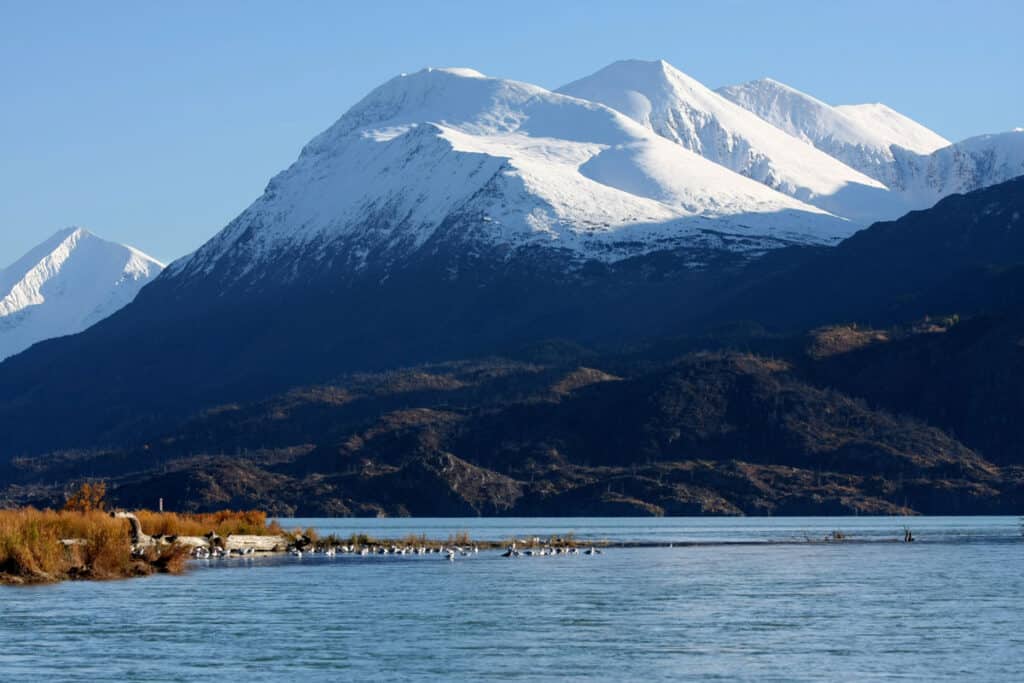
Kenai River, known for great fly fishing, flows into Skilak Lake and eventually Cook Inlet creating an awesome and beautiful fishing wonderland
©iStock.com/Jonathan Nafzger
The Kenai River where Les Anderson caught the massive king salmon in Alaska. It drains the Kenai Peninsula and goes for 82 miles. The river begins at Kenai Lake and ends when it joins the Cook Inlet. There are plenty of activities for outdoor lovers, including fishing, camping, and boating. You can also see spectacular wildlife such as brown bears and eagles.
One major benefit that the Kenai River has when it comes to fishing is its accessibility. There are multiple turn-offs on Alaska’s Sterling Highway to get to the river. It is also rich in fish like the king salmon. The Kenai River is one of the best places in the United States for salmon fishing. As a state, Alaska has some of the best fishing in the entire country. You just need to be able to get there, since some of the most rugged areas are also the hardest to get to.
What Eats King Salmon?
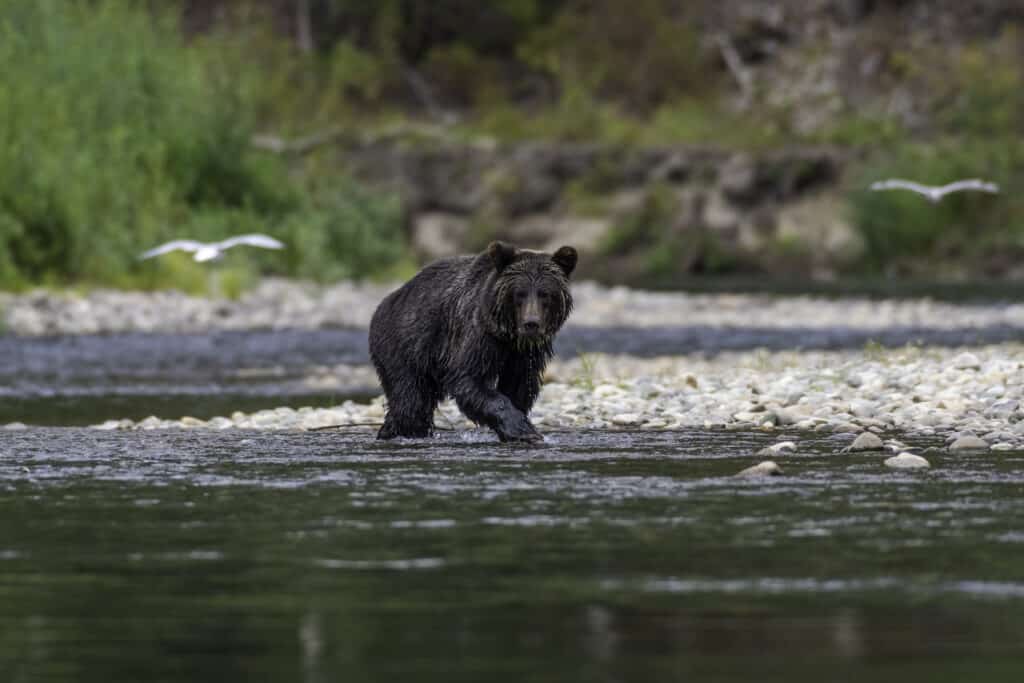
Grizzly bears walk along the river and hunt salmon in British Columbia, Canada.
©iStock.com/psahota
Because they are such large fish, not many predators go after these salmon. When they are juveniles, other fish will eat them. But as they grow, king salmon become harder and harder prey. When they move to the open ocean, sharks and tuna sometimes eat them. But for the most part, once they reach saltwater, king salmon are likely to survive to full maturity.
When they return to freshwater to spawn, king salmon face threats from predators above the water, such as bears and eagles. Bears in particular like standing at the edge of the river and picking out salmon as they swim by. The largest and most dominant bears will eat up to 30 fish in a single day! Of course, smaller bears or those who can’t manage to get the top spot along the river might not get the same feast. Still, bears are one of the top predators of salmon.
King salmon are also popular for recreational and commercial fishing. Anglers like that they put up a fight and are so large, making them a great sport fish. Chefs and diners enjoy the rich flavor and firm flesh so fishing for this species can be profitable commercially. Fortunately, salmon are a relatively sustainable seafood choice if you buy responsibly. The Monterey Bay Aquarium Seafood Watch program recommends looking for U.S. wild-caught salmon or farmed Chinook salmon. They do mention that you should avoid Chinook salmon caught off British Columbia.
The photo featured at the top of this post is © Dec Hogan/Shutterstock.com
Thank you for reading! Have some feedback for us? Contact the AZ Animals editorial team.



